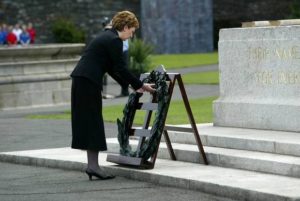The Great War was largely pushed aside in the wake of the 1916 Rising. Sinn Féin’s sweeping electoral victory ensured that the focus was solely on the legacy of Easter 1916 and that World War I was deemed insignificant, if not inappropriate, in Irish society (1).
http://https://www.youtube.com/watch?v=MsL4Zap5tvs
Returning World War I soldiers in southern Ireland faced a variety of negative reactions ranging from lack of acknowledgement of their sacrifices to outright hostility and discrimination in civil service positions (2). This worsened significantly during the Troubles, when veterans often faced suspicion and intimidation from the IRA. Out of 200,000 Irishmen who served in the British Army between 70,000 and 80,000 decided to live elsewhere after the war, largely due to the rise in hostility from militant nationalist forces (3).
“These men [the 1916 leaders] will go down in history as heroes and martyrs; and I will go down – if I go down at all – as a bloody British officer.” – Tom Kettle, a nationalist politician killed on the Somme (4)
Memorials for the men who died in the war were often built away from popular public areas, if at all. Sinn Féin Minister of Justice Kevin O’Higgins insisted that a memorial remain out of sight, saying, “Let there be a war memorial. That is one thing, but a war memorial in Merrion Square, a public park, presumably with the railings gone and leading up to the entrance of Government Buildings, is another thing” (5).

Other types of commemoration were also pushed out of public view for several decades after the end of the war. From 1919-1925 World War I Remembrance Day was acknowledged with a ceremony at College Green in Dublin. These events were often accompanied by disturbances and, after Irish independence in 1925, they were relocated to Phoenix Park, well outside of the city center (6). The Irish government’s Memorial Park was opened in 1948 but there was no official commemoration held there by the state until 2006 (7). There was also little to no acknowledgement of Irish Victoria Cross winners by Ireland’s government until very recently.
Irish political historian Elaine Byrne comments on the absence of World War I in the Irish narrative, saying, “The first world war was not taught in Irish schools. Most Irish people would be surprised to learn that an estimated 200,000 Irishmen served in the British army. The silence in our history books about the 50,000 dead is sorrowing” (8)
“My grandmother did not tell her children about the circumstances of her father’s death and his service in the first world war until she was in her 70s. She did not want anyone to think badly of the father she loved. His final resting place lies outside Eccles near Manchester. ‘We let him be forgotten,’ she once whispered at his grave.” – Elaine Byrne (9)
(1). Leagan Gaeilge, “Irish Soldiers in the First World War,” Department of the Taoiseach, accessed Dec. 5, 2016, http://www.taoiseach.gov.ie/eng/Historical_Information/1916_Commemorations/Irish_Soldiers_in_the_First_World_War.html
(2). Lisa Peatfield, “Ireland’s Role in the First World War,” Imperial War Museums, accessed Dec. 5, 2016, http://www.iwm.org.uk/history/irelands-role-in-the-first-world-war
(3). David Fitzpatrick, “Militarism in Ireland, 1900-1922,” in A Military History of Ireland, eds. Thomas Bartlett and Keith Jeffrey (Cambridge University Press, 1996), 386.
(4). Keith Jeffery, “Ireland and World War One,” BBC, last modified March 10, 2011, accessed Dec. 5, 2016, http://www.bbc.co.uk/history/british/britain_wwone/ireland_wwone_01.shtml
(5). Elaine Byrne, “The Forgotten Irish Soldiers Who Fought for Britain in the First World War,” The Guardian, April 5, 2014, accessed Dec. 5 2016, https://www.theguardian.com/world/2014/apr/05/irish-soldiers-who-fought-for-britain
(6). Keith Jeffery, Ireland and the Great War (Cambridge: Cambridge University Press, 2014), p. 115-116.
(7). “History of Irish National War Memorial Gardens,” Defense Forces Ireland, accessed Dec. 3 2016, http://www.military.ie/en/info-centre/df-ceremonial/history-of-war-memorial-garden/
(8). Elaine Byrne, “The Forgotten Irish Soldiers Who Fought for Britain in the First World War,” The Guardian, April 5, 2014, accessed Dec. 5 2016, https://www.theguardian.com/world/2014/apr/05/irish-soldiers-who-fought-for-britain
(9). Ibid.
